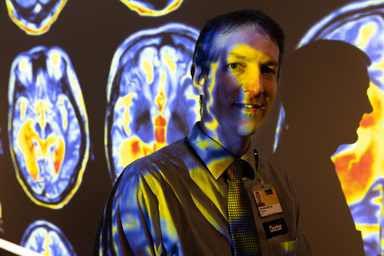Mapping the brain lesions that led multiple patients, once heavy smokers, to abruptly quit has revealed a brain network associated with addiction. The new study, which involved University of Iowa Health Care neuroscientists, suggests that targeting this circuitry with neuromodulation therapies, like transcranial magnetic stimulation or deep brain stimulation, may have potential for treating addiction.
Localized areas of brain damage, caused by stroke or injury, can significantly affect a patient’s physical and cognitive abilities. More surprisingly, these so-called brain lesions can also lead to dramatic changes in behavior, personality, and habits.

In the new study, researchers including Aaron Boes, MD, PhD, UI associate professor of pediatrics and neurology, studied daily smokers who lost their nicotine addiction following a brain lesion. Although the location of the lesions that led to loss of addiction varied from patient to patient, by mapping all the lesions onto a global brain connectivity map, the team was able to identify a specific network of brain regions associated with addiction.
Moreover, when they tested the lesion-mapping approach using a different group of patients, the researchers found the same circuit is also linked to a reduced risk of alcoholism, suggesting that this may be a shared network for addiction to multiple substances. The findings were published June 13 in Nature Medicine.
For the smoking study, Boes and his colleagues looked at data from two groups of patients who were addicted to smoking at the time of focal brain damage. One patient group was drawn from the Iowa Neurological Patient Registry, which was established at the UI in 1982 and is one of the most comprehensive patient registries in the world. The locations of each patient's lesions were mapped to a brain atlas, and the brain network that is functionally connected to each lesion location was computed using data from the human connectome project, an NIH-funded project designed to map the structural and functional connectivity of the human brain. The analysis identified networks that were associated with addiction.
Lesions that disrupted smoking addiction occurred in many different brain locations, but they all mapped to a specific pattern of brain connectivity. This pattern, or circuit, included brain regions that have previously been linked to addiction such as the dorsal cingulate, the lateral prefrontal cortex, and the insula.
“This is a nice example of the Iowa lesion registry having an enduring effect on the field, because the original 2007 study that identified the insula as critical for addiction also used the Iowa registry,” says Boes, who also is a member of the Iowa Neuroscience Institute. “Now this new study, using the latest and greatest approaches for combining lesion data with human connectome data, extends those findings to reveal an entire circuit linked to the insula."
For the smoking study, Boes and his colleagues looked at data from two groups of patients who were addicted to smoking at the time of focal brain damage. The analysis identified networks that were associated with addiction.
Boes notes that by identifying a network of connected brain regions that are all implicated in addiction, the new study helps tie together earlier findings, which identified different individual regions as important.
"The new research shows these earlier findings are not discordant by showing that the regions are all part of the same underlying brain network,” he explains.
In terms of next steps, Boes says he would want to replicate the study with prospective data and evaluate whether the findings can be used to better target addiction related brain circuitry.
“Brain areas that are already being targeted with neurostimulation to try and treat addiction fall within this network, which is reassuring,” he says. “But we may be able to use this new information to target the circuit even more precisely.”
In addition to Boes, UI researcher Joel Bruss was also part of the study team. The senior study author was Michael Fox, MD, PhD, at Harvard Medical School, and researchers from Beth Israel Deaconess Medical Center in Boston, University of Turku in Finland, the National Institute on Drug Abuse, the National Institute of Alcohol Abuse and Alcoholism, Boston Children’s Hospital, University of Pittsburgh, University of Rochester, Northwestern University, AbilityLab in Chicago, and Philips Healthcare in Cambridge, Mass, were part of the research team.